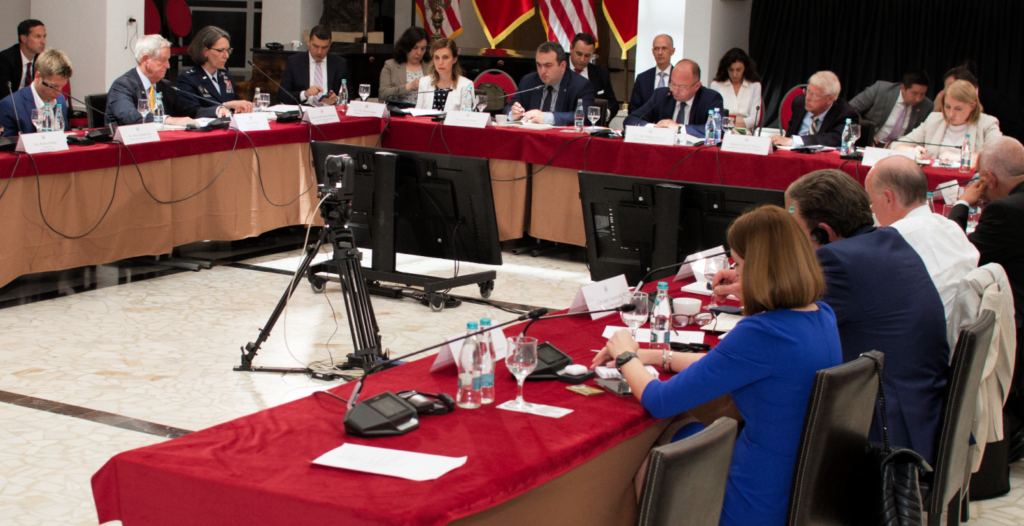Romania

HEARING—Deterrence on NATO’s Eastern Flank
Nov 17, 2025Russell Senate Office Building Room 222 Stream live here Russia’s recent incursions in Estonian, Lithuanian, Polish, and Romanian airspace are part of a campaign to probe for weaknesses along […]

Deterrence on NATO’s Eastern Flank
Nov 17, 2025Russia’s incursions in Estonian, Lithuanian, Polish, and Romanian airspace are part of a campaign to probe for weaknesses along NATO’s eastern flank. With these actions, Moscow aims to gather real-time […]

Senator Wicker and Senator Shaheen Introduce Biparti...
Sep 19, 2025Today, U.S. Helsinki Commission Chairman Senator Roger Wicker, R-Miss., and Commissioner Senator Jeanne Shaheen, D-N.H., introduced the Eastern Flank Strategic Partnership Act of 2025. The legislation establishes it as U.S. […]

Helsinki Commission House Leadership Issue Statement...
May 16, 2025WASHINGTON—U.S. Helsinki Commission Co-Chairman Representative Joe Wilson (SC-02) and Ranking Member Representative Steve Cohen (TN-09) today issued a statement ahead of Romania’s presidential elections this weekend: “Romania is a core […]

Chairman Wilson and Ranking Member Cohen Condemn Rus...
Dec 05, 2024WASHINGTON—Today, U.S. Helsinki Commission Chairman Representative Joe Wilson (SC-02) and Ranking Member Representative Steve Cohen (TN-09) issued the following statement condemning Russia’s malign interference in the Romanian presidential election, the second round of which is scheduled […]
Helsinki Commission Delegation Convenes Historic Bla...
Jul 14, 2022WASHINGTON—From June 29 – July 9, Helsinki Commission Ranking Member Sen. Roger Wicker (MS) led a bipartisan, bicameral congressional delegation to Romania, the United Kingdom, Finland, and Sweden to consult […]

Black Sea Security Summit
Jul 01, 2022A Roundtable Dialogue Hosted by the Commission on Security and Cooperation in Europe On the heels of the 2022 NATO Summit in Madrid, on July 1 the Commission on Security […]
HELSINKI COMMISSION DIGITAL DIGEST JUNE 2022
Jun 30, 2022Helsinki Commission to Convene Black Sea Security Su...
Jun 27, 2022WASHINGTON—On the heels of the 2022 NATO Summit in Madrid, on July 1 the Commission on Security and Cooperation in Europe, also known as the Helsinki Commission, will convene its […]

European Energy Security Post-Russia
Jun 07, 2022Russia is weaponizing energy to prolong its unlawful invasion of Ukraine. Unfortunately, the sanctions that Europe and the United States have put in place have not been enough to curb […]
European Energy Security Focus of Upcoming Helsinki ...
Jun 02, 2022WASHINGTON—The Commission on Security and Cooperation in Europe, also known as the Helsinki Commission, today announced the following hearing: EUROPEAN ENERGY SECURITY POST-RUSSIA Tuesday, June 7, 2022 2:30 p.m. Watch […]
Helsinki Commission Recognizes Key Contributions fro...
Mar 08, 2022WASHINGTON—In light of Russia’s continued criminal war on the peaceful citizens of Ukraine, Helsinki Commission Chairman Sen. Ben Cardin (MD), Co-Chairman Rep. Steve Cohen (TN-09), Ranking Member Sen. Roger Wicker […]
